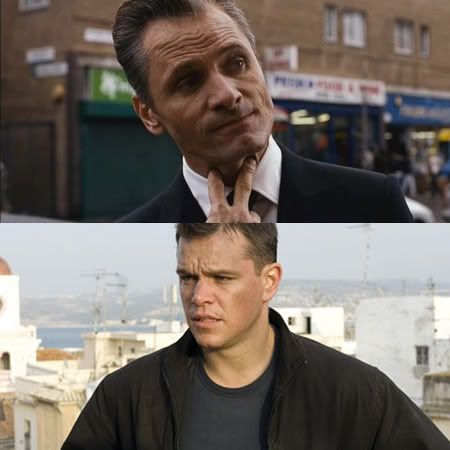 NOTE: There might be plot spoiling elements for those who have not seen the films discussed in this essay. I highly recommend you see both immediately.
NOTE: There might be plot spoiling elements for those who have not seen the films discussed in this essay. I highly recommend you see both immediately.
In the new millennium the effects of global immigration, neo-conservative politics that plague and add to the paranoia and fearfulness of modern society, and violence as a threat to an apathetic culture have trickled down to not only shaping our world at large but ushering in a new hero on film. He's a little world weary, abides by a ardent moral and ethical code, and personifies a paradox that exudes a murky duality. Two recent films, Paul Greengrass's "The Bourne Ultimatum" and David Cronenberg's "Eastern Promises" present such men in the form of Jason Bourne (Matt Damon) and Nikolai Luzhin(Viggo Mortensen), who are eternally at odds with their environments and themselves. These two quietly hard boiled specimens exist in a world that is dark and shadowy in its corrupt fueled hierarchy, geographically influenced by a globalized society, and a life is of rich value although they are frequently asked to compromise that fact and dig into that devilish and violent core that typifies the other side of the angelic coin. It's that rabid violence that defines them but they are just as revolted by their power as they are attracted to it. These two creatures could not be any more disparate but the violent tie that binds them is unshakable and revealing of a new desensitized attitude towards violence as portrayed in mainstream media. It's a little more grim and grisly, but could that be our sick desire to watch it or is it simply a mirror effect of what's happening in the crevices of the never ending saga that is the War on Terror?
In the third installment of the Jason Bourne series we find our dashing and brooding hero at the apex of his fight to obtain not only his identity but expose the organization that has controlled him and made him fight for his identity. "The Bourne Ultimatum" informs us that a sect of the Central Intelligence Agency brainwashed "willing" participants in an experiment to transform your well intentioned government agents into a precise and mentally vacant killing machine. They don't ask questions but they are well equipped with the knowledge of how to kill without a trace. Images of Bourne enduring various methods of torture and exploitation call to mind the atrocities of Abu Ghraib. This learned form of sadistic violence backfires when Bourne uses his power not for the intended purposes of reinforcing fear, dominance, and other forms of scare tactics but rather to bring down the root of all evil, white male privilege that exists in powerful positions. C.I.A. Deputy Director Noah Vosen (David Strathairn) and Dr. Albert Hirsch (Albert Finney) are the Gepetto-like masters who have exploited the fragility and apathy of post-9/11 America, where such heinous acts are justifiable if they are tagged with the phrase, "We are trying to protect the American people." Protection fades into harm when America is bamboozled in effort to protect the inept and corrupt that rule and control the Western world. Bourne's violent intuition is a reaction to this idea and thus is not used to oppress but liberate, and for that he is no longer part of the system that binds him.
A fight scene between Bourne and an agent sent to kill him is one of the most well choreographed and frenetic fight scenes I've ever seen. Set in a tightly confined home in Tangiers, Bourne explodes on the agent using his physical strength and instinct, which is quite different for a major fight scene in a studio blockbuster. No shower of bullets or dialogue said with a smirk; this is the primal and violent side of man. Bourne uses his hands or grabs a book or wash cloth to protect himself. Greengass, ever the stylist, propels the action with a cinema vérité inspired handheld camera and natural light. The scene is visceral and culminates in an intense brawl in a dingy bathroom where Bourne grits his teeth like a possessed beast when his hands choke the last breath out of his foe. However, in the next scene Bourne is remorseful and responsible for his actions. He loathes that the only way he knows how to solve a matter of someone infringing upon his life is to destroy and obliterate the opposing force. This humanism imbues the Bourne character with an interesting layer that most plastic and pumped up action heroes are completely removed of. The Bourne films ponders the possibility of whether good is achievable when evil is almost inherently has to be used. It's a daring proposition that also finds a place in the underbelly of the Russian mafia in Cronenberg's "Eastern Promises."
Similar to "The Bourne Ultimatum", a moody pall drifts over the story that is set in a new London experiencing the influx of Russian and other eastern cultures. Nikolai's internal conflict becomes more transparent when Anna (Naomi Watts), a midwife, searches for the identity of a newborn's family. The mother of a child, a deceased teenage prostitute, leaves her diary that leads Anna to Nikolai and the or vory v zakone. He's as steely and stiff as his bouffant of silver hair that rests hard on his head. His role as the chauffeur for the mob makes him present without having to be entirely culpable of the mob's decisions. His boss, the indomitable patriarch, Semyon (Armin Mueller-Stahl) speaks with a voice that sounds like tires grinding on gravel and his intense eyes twinkle with evil that bely his meek old man exterior. It wouldn't be far off to compare the President and his family to Semyon and his boozy fuck up a son, Kirill (Vincent Cassel), where loyalty and tradition are equally important but potentially fatal. The theme of survival is key in the film and particularly in context to the Nikolai's relationship with the family that is coming undone as secrets bubble to the surface and possibly damage their power.
Survival and what that means in the world now is a perfect frame of reference for both films because of their almost back to primitivism points of view. In a world where contemporary politics and violence have turned arbiters of violence into machine gun toting androids, Nikolai's body becomes his means of survival. Tattoos etched across his body explain his history of violence and his eventual transcendence into a morally reprehensible heaven/hell. It's taken too a brutal level when Nikolai's true identity is almost entirely eradicated during a fight in a steamy bathhouse finds Nikolai at his most vulnerable. Devoid of clothes, weaponry, or tricky editing, Nikolai defends himself, naked, against two clothed thugs, suggesting the tension between the savaged and the civilized. It's a thrilling sight to watch a man removed from everything comfortable and contemporary transform into a something so primitive and basic. He's naked, full of instinct, and no one is going to take his precious life. In a Scorsesian way the camera pulls back at the end of the scene to examine the carnage and it's quite a breathtaking blend of blood, bodies, and the hard white floor of the baths.
Whether or not these films are consciously communicating a relevant statement about man and his place in a post-9/11 world, it is clear that they do speak about the body, the necessity of survival, and good versus evil. It's difficult living in this world, but surviving for some is even more difficult. The paradox of man has shifted into something a little more self-reflective and it questions whether or not that ravenous violent bone in the body is natural or learned. Bourne and Nikolai are both products of brainwashing for a group they are hired to protect and serve, but they are also ashamed of their violent streaks. It's their eternal conflict, where their natural self competes with their nurtured self. Violence is a sickness and a love for them. However the greatest and perhaps most disturbing sickness is our love to watch it and enjoy it. But then again that's the beautiful and ugly inside of us all that is at once turned off by it and more importantly joyfully turned on by it.
Monday, September 24, 2007
a new world, a new man
Subscribe to:
Post Comments (Atom)



No comments:
Post a Comment